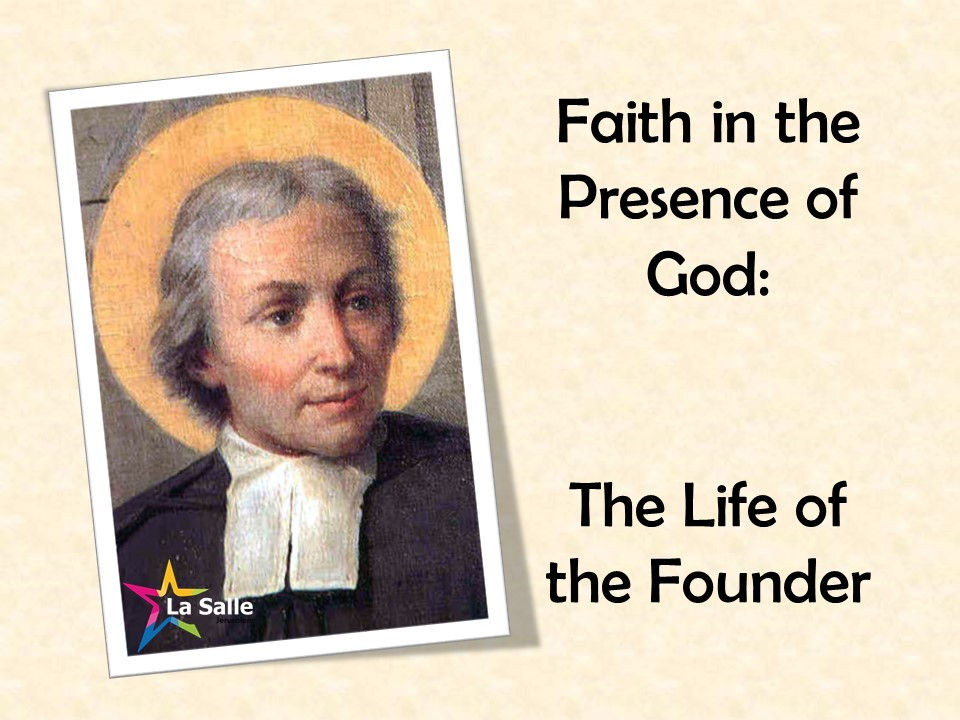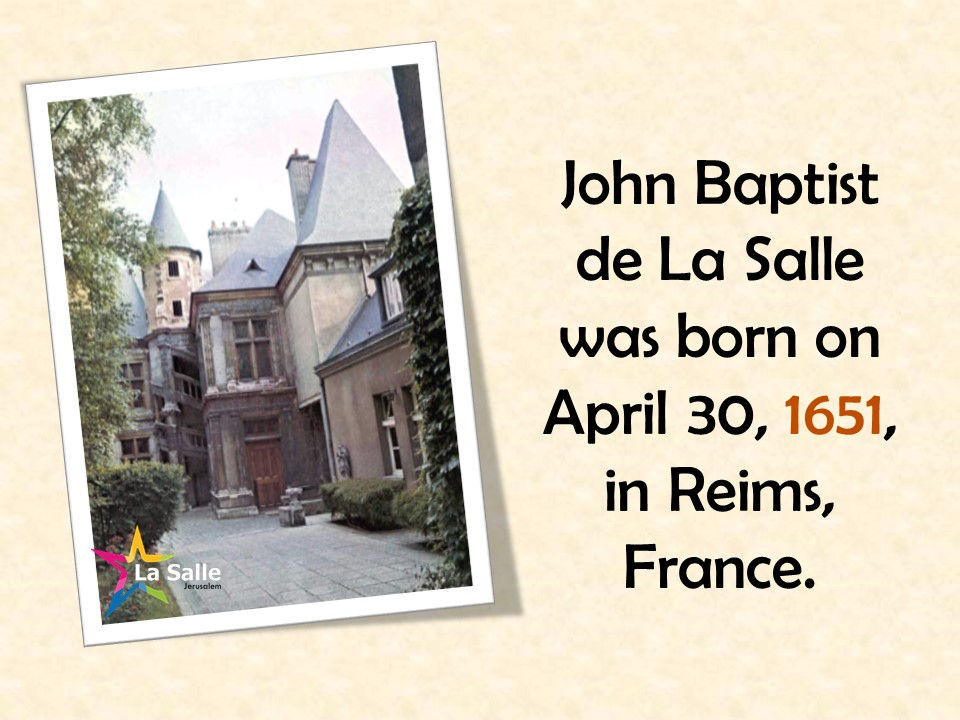St. John Baptist
de La Salle
Founder of the Institute of the Brothers of the Christian Schools,
Patron of Christian Teachers.
John Baptist de La Salle was born into a world very different from our own. He was the first son of wealthy parents living in France over 300 years ago. Born at Reims, John Baptist de La Salle received the tonsure at age eleven and was named Canon of the Reims Cathedral at sixteen. Though he had to assume the administration of family affairs after his parents died, he completed his theological studies and was ordained a priest on April 9, 1678.Two years later he received a doctorate in theology. Meanwhile he became tentatively involved with a group of rough and barely literate young men in order to establish schools for poor boys.
De La Salle
Born at Reims, France April 30, 1651
Ordained priest April 9, 1678
Died April 7, 1719
Beatified February 19, 1888
Canonized May 24, 1900
Proclaimed Patron of Christian Teachers
May 15, 1950
At that time a few people lived in luxury, but most of the people were extremely poor: peasants in the country, and slum dwellers in the towns. Only, a few could send their children to school; most children had little hope for the future. Moved by the plight of the poor who seemed so “far from salvation” either in this world or the next, he determined to put his own talents and advanced education at the service of the children “often left to themselves and badly brought up.” To be more effective, he abandoned his family home, moved in with the teachers, renounced his position as Canon and his wealth, and so formed the community that became known as the Brothers of the Christian Schools.
His enterprise met opposition from the ecclesiastical authorities who resisted the creation of a new form of religious life, a community of consecrated laymen to conduct gratuitous schools “together and by association.” The educational establishment resented his innovative methods and his insistence on gratuity for all, regardless of whether they could afford to pay. Nevertheless De La Salle and his Brothers succeeded in creating a network of quality schools throughout France that featured instruction in the vernacular, students grouped according to ability and achievement, integration of religious instruction with secular subjects, well-prepared teachers with a sense of vocation and mission, and the involvement of parents.
In addition, De La Salle pioneered in programs for training lay teachers, Sunday courses for working young men, and one of the first institutions in France for the care of delinquents. Worn out by austerities and exhausting labours, he died at Saint Yon near Rouen early in 1719 on Good Friday, only weeks before his sixty-eighth birthday.
John Baptist de La Salle was a pioneer in founding training colleges for teachers, reform schools for delinquents, technical schools, and secondary schools for modern languages, arts, and sciences. His work quickly spread through France and, after his death, continued to spread across the globe. In 1900 John Baptist de La Salle was declared a Saint. In 1950, because of his life and inspirational writings, he was made Patron Saint of all those who work in the field of education. John Baptist de La Salle inspired others how to teach and care for young people, how to meet failure and frailty with compassion, how to affirm, strengthen and heal. At the present time there are De La Salle schools in 80 different countries around the globe.

JB De La Salle story in photos
The Patron Saint Trailer (Animation)
Life of St John Baptist De La Salle
Writings of the Founder
Lasallian Studies offers the text of the complete works of De La Salle.
The text published in 1993 has been checked, with added notes and cross references. The whole text and each of the works carries an introduction, written by Brother Alain Houry, Archivist of the Generalate.
•General introduction to the writings of De La Salle
•Introduction to the Common Rules and the Rule of the Brother Director.
•Common Rules RC
•Rule of the Brother Director FD
•Introduction to Memoire on the Habit.
•Reflections on the Habit MH
•Introduction to personal writings
•Personal writings EP
•Introduction to the Collection of Different Small Treatises
•Collection of Different Small Treatises R
•Introduction to the Directories
•Directories RD
•Introduction to the Explanation of the Method of Mental Prayer
•Explanation of the Method of Mental Prayer EM
•Introduction to the Meditations for Sundays and Feasts
•Meditations for Sundays MD
•Meditations for Feasts MR
•Introduction to Meditations for the Time of Retreat
•Meditations for the Time of Retreat MR
•Introduction to the Letters
•Original manuscript letters LA
•Copied letters LC
•Printed letters LI
•Introduction to The Conduct of Schools
•MaConduct of Schools CE
•Introduction to Rules of Politeness
•Rules of Politeness and Christian Good Manners RB
•Introduction to Duties of a Christian A
•Duties of a Christian A DA
•Introduction to Duties of a Christian B, and of the Largerand Smaller Outlines (summaries)
•Duties of a Christian B DB
•Larger Summary of Duties GA
•Smaller Summary of Duties PA
•Introduction to Duties of a Christian C
•DDuties of a Christian C DC
•Introduction to Instructions and Prayers
•Instructions and Prayers I
•Introduction to Exercises of Piety
•Exercises of Piety E
•Introduction to Hymns (Spiritual Canticles) A
•Hymns A CA S








